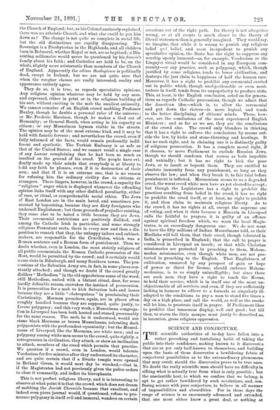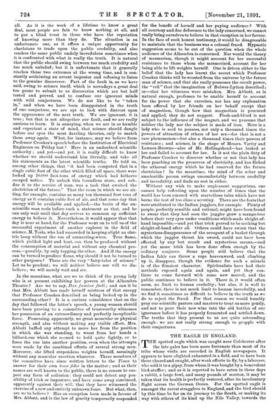SCIENCE AND CONJECTURE.
THE scientific authorities of to-day have fallen into a rather provoking and tantalising habit of taking the public into their confidence, making known to it discoveries that are as yet only half-known to themselves, and building upon the basis of those discoveries a bewildering fabric of conjectural possibilities as to the extraordinary phenomena that may result should the discoveries prove to be tree ones. No doubt the really scientific man should have no difficulty in sifting what is actually true from what is only possible ; but the unscientific host, to which we confess that we belong, is apt to get rather bewildered by such revelations, and, con- fusing science with pure conjecture, to believe in all manner of impossibilities and absurdities. For in these days the range of science is so enormously advanced and extended, that one must either know a great deal, or nothing at
all. As it is the work of a lifetime to know a great deal, most people are fain to know nothing at all, and to put a blind trust in those who have the reputation of knowing more than they do. The situation is an unfortunate one, as it offers a unique opportunity for charlatans to trade upon the public credulity, and also renders the same public unduly incredulous sometimes when it is confronted with what is really the truth. It is natural that the public should swing between too much credulity and too much unbelief ; but it is unfortunate that it generally reaches those two extremes at the wrong time, and is con- stantly acclaiming an arrant impostor and refusing to listen to the genuine discoverer. Part of the fault is, as we have said, owing to science itself, which is nowadays a great deal too prone to submit to us discoveries which are but half tested and proved, and to confuse our ignorant minds with wild conjectures. We do not like to be " taken in," and when we have been disappointed in the truth of one conjecture, we are apt to look with distrust upon the appearance of the next truth. We are ignorant, it is true ; but that is not altogether our fault, and we are really anxious to learn. It is annoying, when we are in so humble and expectant a state of mind, that science should dangle before our eyes the most dazzling theories, only to snatch them away again. What, for instance, may we believe from Professor Crookes's speech before the Institution of Electrical Engineers on Friday last ? Here is an undoubted scientific authority ; and yet--and yet, it is really difficult to know whether we should understand him literally, and take all his statements as the latest scientific truths. He told us, among other things, that " it had been computed that in a single cubic foot of the ether which filled all space, there were locked up 10,000 foot-tons of energy which had hitherto escaped notice. To unlock this boundless store, and sub- due it to the service of man, was a task that awaited the electrician of the future." That the room in which we are sit- ting, for example, contains as many ten thousand foot tons of energy as it contains cubic feet of air, and that some day that energy will be available and applied,—the brain of the un- scientific man reels before such a statement as that, and he can only wait until that day arrives to summon up sufficient energy to believe it. Nevertheless, it would appear that that day is near at hand, for the Professor went on to tell us of the successful experiment of another explorer in the field of science, M. Tesla, who had succeeded in keeping alight an elec- tric lamp without the use of connecting-wires. True flame, which yielded light and heat, can then be produced without the consumption of material and without any chemical pro- cess,—possibly, by only tapping the ether. And if the energy can be turned to produce flame, why should it not be turned to other purposes ? These are the very " fairy-tales of science." Let us be prudent; we will neither believe nor will we dis- believe ; we will merely wait and see.
In the meantime, what are we to think of the young lady who is at present exhibiting her powers at the Alhambra Theatre ? Are we to say, Dux fcemina facti ; and can it be that Mrs. Abbott has made herself mistress of that energy that Professor Crookes described as being locked up in the surrounding ether ? It is a curious coincidence that on the day that followed the latter's speech, a young woman should have been proving to a committee of trustworthy witnesses her possession of an extraordinary and perfectly inexplicable force. Possessing, apparently, no great muscular or physical strength, and also without making any visible effort, Mrs. Abbott baffled any attempt to move her from the position in which she was standing, to wrest from her hands a billiard-cue which she seemed to hold quite lightly, or to force the cue into another position, even when the attempts were made by the combined efforts of several strong men. Moreover, she lifted stupendous weights herself, seemingly without any muscular exertion whatever. Three members of the committee have since written letters to the Times to answer for their own bona fides in the matter; and as their names are well known to the public, there is no reason to sus- pect any form of collusion : they could not detect any pos- sibility of trick or imposture, and have come away convinced, apparently against tjleir will, that they have witnessed the exercise of a new and entirely unknown force. But what, then, are we to believe ? Has an exception been made in favour of Mrs. Abbott, and is the law of gravity temporarily suspended
for the benefit of herself and her paying audience ? With all courtesy and due deference to the lady concerned, we cannot
really bring ourselves to believe in that exception in her favour. In the face of such honest testimony, it would be disagreeable to maintain that the business was a colossal fraud. Hypnotic suggestion seems to be out of the question when the whole audience of the Alhambra is concerned. Nor would the theory .
of mesmerism, though it might account for her successful resistance to those whom she mesmerised, account for her being able to lift weights herself. One is driven either to the belief that the lady has learnt the secret which Professor Crookes thinks will be wrested from the universe by the future man of science, and that she really possesses the occult power, the " vril" that the imagination of Bnlwer-Lytton described; or—that her witnesses were mistaken. Mrs. Abbott, as is natural enough, professes to be unable herself to account for the power that she exercises, nor has any explanation been offered by her friends on her behalf except that of magnetism, though how that magnetism is procured and applied, they do not suggest. Flesh-and-blood is not subject to the influence of the magnet, and we presume that neither the lady nor the subject is made of iron. Here is a lady who is said to possess, not only a thousand times the powers of attraction of others of her sex—for that is not a rare phenomenon—but also a thousand times their powers of resistance ; and science, in the shape of Messrs. Verity and Lennox-Browne—also of Mr. Hollingshead—has looked at her and failed to account for her. Is it not the plain duty of Professor Crookes to discover whether or not that lady has been poaching on the preserves of electricity, and has filched the mthereal energy which he had reserved for the future electrician ? In the meantime, the mind of the sober and unscientific person swings uncomfortably between credulity and incredulity, and finds no rest in either.
Without any wish to make unpleasant suggestions, one cannot help reflecting upon the number of times that the world has been amused with marvellous tales which have not borne the test of too close a scrutiny. There are the feats that were attributed to the Indian jugglers, for example. Plenty of people, perfectly sensible and rational, might have been found to swear that they had seen the juggler grow a mango-tree before their very eyes under conditions which made sleight-of- hand impossible,—and yet that trick proved to be nothing but sleight-of-hand after all. Others could have sworn that the mysterious disappearance of the occupant of a basket through which the juggler thrust his sword, could not have been effected by any but occult and mysterious means,—and yet the same trick has been done often enough by the ordinary conjurer. Some people still believe that the Indian fakir can throw a rope heavenward, and, climbing up it, disappear, though the evidence for such a miracle is of the flimsiest character. Spiritualists have had their methods exposed again and again, and yet they con- tinue to come forward with some new marvel, and the public continues to believe in it. There is, it would often seem, no limit to human credulity; but also, it is well to remember, there is not much limit to human incredulity, and we find it sometimes as difficult to believe in the truth as we do to reject the fraud. For that reason we would humbly pray our scientific pastors and masters to treat us more gently, and not to pour their new wine into the old bottles of our ignorance before it has properly fermented and settled down. The truths that they present to us are quite astounding enough : we are not really strong enough to grapple with their conjectures.



















































 Previous page
Previous page